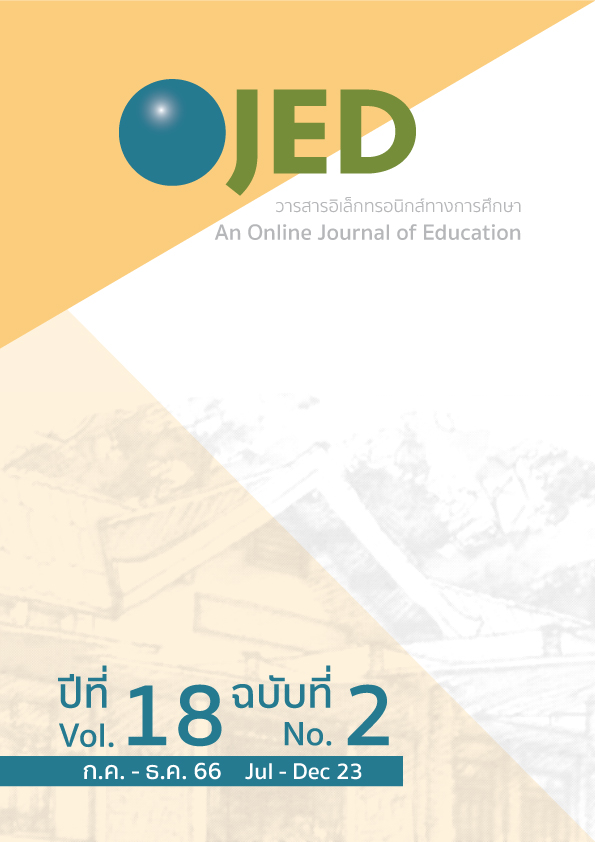Administrators’ Supervisory Skills that Influence the World Class Standard Outcomes of Secondary Schools
DOI:
https://doi.org/10.14456/ojed.2023.11Keywords:
administrators’ supervisory skills, the world-class standard outcomesAbstract
The objectives of this research were: 1) to study the level of supervision skills of school administrators who have been awarded the world-class standard school award at the secondary level; 2) to study the level of performance of the outcomes of schools that have been awarded the world-class standard school award for secondary education, and 3) to study the supervision skills of school administrators that affect the outcomes of world-class standard secondary schools. The population used in the research was among 280 schools that received the quality award from the Office of the Basic Education Commission for secondary education. The informants are five teachers from each school who perform the duties of school supervisors, namely curriculum, grade level, personnel, policy and planning, and financial management, totaling 810 informants. Research instruments include a 5-level rating scale questionnaire, data analysis using frequency, percentage, mean, standard deviation, correlation coefficient analysis, and enter multiple regression analysis.
The research results showed that 1) executives’ overall level of supervision skills averaged 4.04 at the high level. 2) The performance level of world class standard school outcomes averages 4.89 at the highest level. 3) two skills in executive supervision affect the outcome of world class standard school: personnel management skills and assessment skills.
References
ภาษาไทย
จารุกิตติ์ สิทธิยานนท์. (2559). การพัฒนาการบริหารวิชาการของโรงเรียนมาตรฐานสากลตามแนวคิดพลเมือง
โลกศึกษา [วิทยานิพนธ์มหาบัณฑิต]. จุฬาลงกรณ์มหาวิทยาลัย.
จุไรรัตน์ สุดรุ่ง. (2559). การนิเทศภายในโรงเรียน. แดเน็กซ์อินเตอร์คอร์ปอเรชั่น.
ธพลศจกรณ์ พิมพิชัยธกุล. (2561). การพัฒนาคู่มือการบริหารทรัพยากรมนุษย์ของโรงเรียนมาตรฐานสากล
ตามเกณฑ์รางวัลคุณภาพแห่งสำนักงานคณะกรรมการการศึกษาขั้นพื้นฐาน [วิทยานิพนธ์มหาบัณฑิต].
จุฬาลงกรณ์มหาวิทยาลัย.
นิตยา เทพอรุณรัตน์. (2557). การพัฒนารูปแบบการบริหารโรงเรียนมาตรฐานสากลในประเทศไทย
[วิทยานิพนธ์ดุษฎีบัณฑิต]. จุฬาลงกรณ์มหาวิทยาลัย.
ไพฑูลย์ สินลารัตน์, และนักรบ หมี้แสน. (2561). ความเป็นผู้นำทางการศึกษา. สำนักพิมพ์แห่ง
จุฬาลงกรณ์มหาวิทยาลัย.
เมธี ทองคำ. (2558). การบริหารจัดการระบบคุณภาพในโรงเรียนมาตรฐานสากลของโรงเรียนระดับมัธยม
ศึกษา สังกัดสำนักงานเขตพื้นที่การศึกษามัธยมศึกษา เขต 9 [วิทยานิพนธ์มหาบัณฑิต].
มหาวิทยาลัยราชภัฏนครปฐม.
รื่น หมื่นโกตะ. (2557). กระบวนการวางแผนกลยุทธ์ในการบริหารการเปลี่ยนแปลงของผู้บริหารโรงเรียน
มัธยมศึกษาในโครงการโรงเรียนมาตรฐานสากล. [วิทยานิพนธ์ดุษฎีบัณฑิต].
มหาวิทยาลัยอีสเทิร์นเอเชีย.
สำนักงานคณะกรรมการการศึกษาขั้นพื้นฐาน. (2553). แนวทางการดำเนินงาน โรงเรียนมาตรฐานสากล
WORLD-CLASS STANDARD SCHOOL. โรงพิมพ์ชุมนุมสหกรณ์การเกษตรแห่ง
ประเทศไทย จำกัด.
สำนักงานคณะกรรมการการศึกษาขั้นพื้นฐาน. (2559). เกณฑ์รางวัลคุณภาพแห่งสำนักงานคณะกรรมการ
การศึกษาขั้นพื้นฐาน OBECQA ปี 2559-2560. โรงพิมพ์ชุมนุมสหกรณ์การเกษตร
แห่งประเทศไทย จำกัด.
สำนักงานคณะกรรมการการศึกษาขั้นพื้นฐาน. (2561). แนวทางการดำเนินงานโรงเรียนมาตรฐานสากล
World-Class Standard School ปรับปรุง พ.ศ. 2561. โรงพิมพ์ชุมนุมสหกรณ์การเกษตรแห่งประเทศไทย จำกัด.
สำนักงานคณะกรรมการการศึกษาขั้นพื้นฐาน. (2563). สารสนเทศโรงเรียนในสังกัดสำนักงานคณะกรรม
การการศึกษาขั้นพื้นฐาน. โรงพิมพ์ชุมนุมสหกรณ์การเกษตรแห่งประเทศไทย จำกัด.
สำนักงานเลขาธิการสภาการศึกษา. (2560). แผนการศึกษาแห่งชาติ พ.ศ. 2560 – 2579.
บริษัท พริกหวานกราฟฟิก จำกัด.
ภาษาอังกฤษ
Beach, D.M. & Reinhartz, J. (2000). Supervision Leadership: Focus on Instruction. Allyn & Bacon.
Krejcie, R.V., & D.W. Morgan. (1970). Determining Sample Size for Research Activities.
Educational and Psychological Measurement. 30(3), 607-610.
Wiles, K & J.T. Lovell. (1983). Supervision for Better Schools. Pearson.
Downloads
Published
How to Cite
Issue
Section
License
Copyright (c) 2023 An Online Journal of Education

This work is licensed under a Creative Commons Attribution-NonCommercial-NoDerivatives 4.0 International License.




